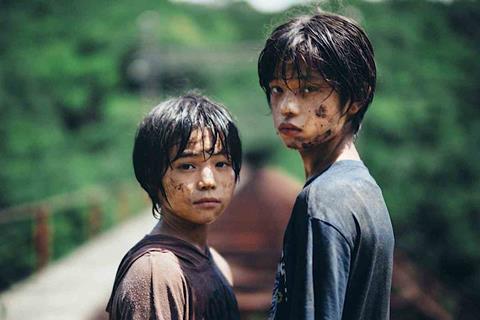Hirokazu Kore-eda brings emotional nuance to a moral tale about school bullying, scored by the late Ryuichi Sakamoto

Dir: Kore-eda Hirokazu. Japan. 2023. 126mins.
Working with someone else’s script for the first time since his debut Maborosi, Japanese auteur Hirokazu Kore-eda delivers a story set against the background of a provincial elementary school, one whose intricate plotting and tricksy time structure – designed both to make us work to understand who did what to who, and to play with our shifting sympathies – delivers rich dividends, in part. In the end, there’s something just a little too neatly constructed about Monster, something just a little trite about the message delivered after so many narrative twists and turns. Yet there is an emotional delicacy here too that keeps sentiment at bay, at least most of the time.
The real treasure though, is a plaintive, delicate soundtrack of music written and performed by the late Ryuichi Sakamoto
Kore-eda’s audience is broader than it ever was and, despite a distinct feeling here that he’s taken on a filler gig, viewers will respond to the touching chords of a drama which is about how monsters – the human kind – are often only a matter of perspective. (The film has sold to multiple territories ahead of its Competition premiere.) There are some fine performances, including Sakura Ando, who was such a revelation in the director’s 2018 Palme d’Or winner Shoplifters.
Monster opens with a conflagration that lights up the city sky, and ends with bright sunlight illuminating a typhoon-lashed forest. One 10-year-old features in both scenes: Minato (Soya Kurokawa), an intense, rather solitary boy who lives with his single mother Saori, sensitively played by Ando as a woman who loves her son but sometimes (as many parents do) can’t help seeing him as a recently-landed alien.
Tell-tale signs lead Saori to believe that Minato is being bullied at school by one of his teachers, the young new recruit Michitoshi (Eita Nagayama). Or is it Minato himself who is the bully – or something worse? After all, his schoolmate Yori (Hinata Hiiragi)– a dreamer of a boy who seems much younger than the others in his class, and knows the names of flowers – is covered in bruises. But then again, there seems to be some kind of cover-up going on at the school, one piloted by stern, cold-eyed headmistress Makiko (a magnetic performance by veteran Yuko Tanaka). Could the school itself perhaps be the monster?
The method adopted by Kore-eda’s scriptwriter of choice, the seasoned TV scribe Yuji Sakamoto, is to replay scenes from different points of view so that events or signals that triggered Saori’s alarm in the first narrative run-through – a missing sneaker, a cigarette lighter, Minato’s bruised ear – are gradually provided with layered explanations. This works well in a standout scene in which Saori, in school to complain about Michitoshi’s behaviour, is stonewalled with deep, meaningless apologies (there’s an implied cultural critique here that will likely resonate with Japanese audiences).
It’s only later that the headmistress’ comment to the beleaguered Michitoshi (who feels like he’s being hung out to dry) that “what actually happened does not matter” is given some nuance, made less chilling and more human. In a world where media spin is rife and parents are so often on the warpath, perhaps, from a head teacher’s point of view, there’s some sense in not always telling the absolute truth.
The real treasure of this film is a plaintive, delicate soundtrack of music written and performed (mostly on the piano) by the late Ryuichi Sakamoto. Only two of the pieces here were expressly composed for the film by the already ailing musician, but the mix of these with tracks from two of Sakamoto’s albums is finely gauged.
The film’s lakeside setting – the city of Suwa in Nagano Prefecture – is also used inventively. The urban environment, which is so difficult for both adults and children to navigate emotionally and ethically, is contrasted with the world suspended between nature and fairy-tale where the two boys at the heart of the story take refuge. An abandoned railway carriage surrounded by verdant vegetation at the end of a dark, dank tunnel, this safe place where these kids work out their feelings far from adult interference feels like an homage to Miyazaki – specifically Spirited Away. There’s a serious message about tolerance and nurturing difference in an ending that leaves the story poised between resolution and valediction.
Production companies: Toho Co Ltd, Fuji Television Network Inc, Gaga Corporation, Aoi Pro Inc, Bun-Buku Inc
International sales: Goodfellas, Flavien Eripret, feripret@goodfellas.film
Producers: GenkiKawamura, Kenji Yamada
Screenplay: Yuji Sakamoto
Production design: Keiko Mistumatsu
Editing: Hirokazu Kore-eda
Cinematography: Kondo Ryuto
Music: Ryuichi Sakamoto
Cast: Sakura Ando, Eita Nagayama, Soya Kurokawa, Hinata Hiiragi, Yuko Tanaka























